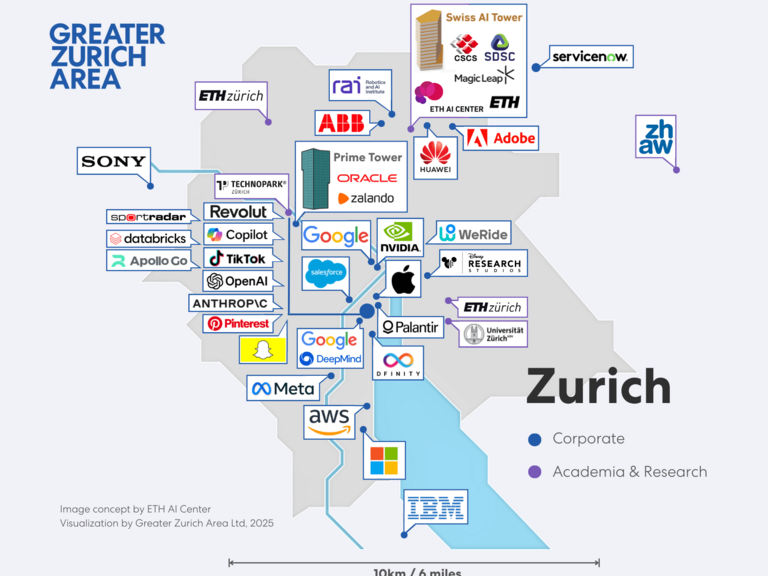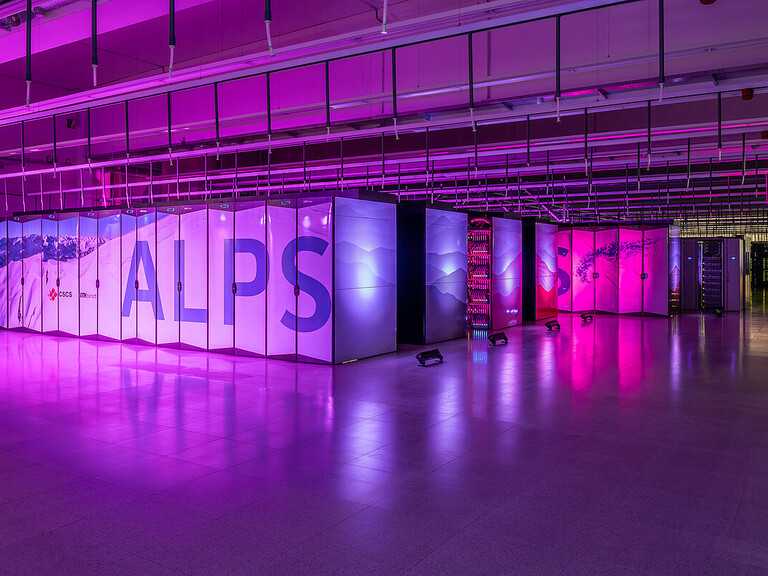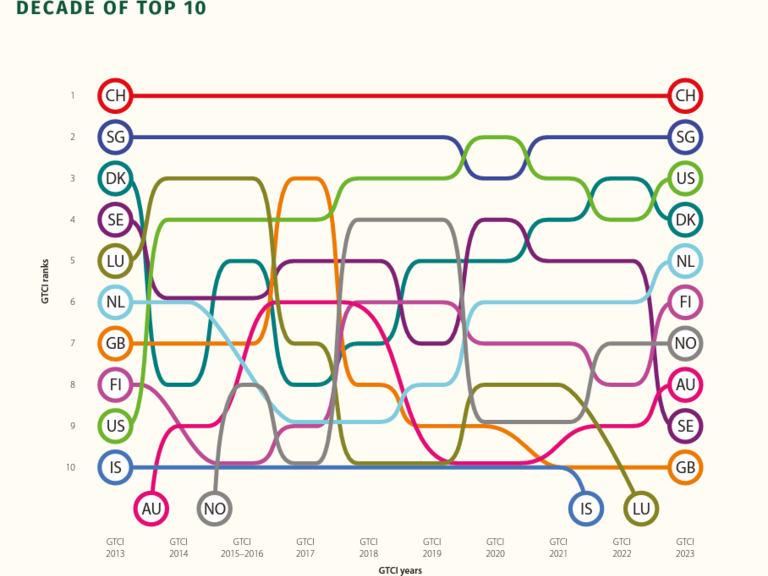

Zurich at the Heart of AI Innovation
Why is Switzerland a hub for artificial intelligence (AI)?
Zurich is emerging as an innovation powerhouse in artificial intelligence (AI) — a vibrant hub where world-leading research meets global tech giants. Combining cutting-edge universities, a deep talent pool, and a stable, innovation-friendly environment, the Swiss city is shaping the future of AI.

In the rapidly evolving world of artificial intelligence, Zurich has secured a place among the most dynamic global hubs. Switzerland also has a long-standing reputation for precision and innovation — recognized by its #1 ranking in the Global Innovation Index since 2011 (World Intellectual Property Organization). Furthermore, relative to its population size, Switzerland has generated more unicorns than nearly any other country worldwide and ranks first in patent applications per million inhabitants (Patent Index 2023, EPO). These facts underpin the momentum for innovation. Nowhere is this more visible than in the Greater Zurich Area, home to top research institutions, groundbreaking startups, and a growing cluster of international AI labs.
1. Academic excellence drives innovation
At the center of Zurich’s AI strength is its academic ecosystem. The Greater Zurich Area is home to some of the world’s top universities in AI: ETH Zurich, IDSIA, University of Zurich, and ZHAW are at the forefront of AI research across various domains - from foundational AI principles to advanced machine learning and robotics applications.
ETH Zurich, ranked first in Europe by the 2023 European Deep Tech Report by dealroom.co
for AI research and innovation by patent output and 7th in the world by QS World University Ranking (Quacquarelli Symonds) by Subject on “Data Science and Artificial Intelligence,” anchors a dense network of institutions, including the ETH AI Center — a hub fostering the development of trustworthy and inclusive AI systems in partnership with leading AI companies such as Meta, Google, Magic Leap, and IBM.
Beyond the Greater Zurich Area, other Swiss institutes have made landmark contributions: the Dalle Molle Institute for Artificial Intelligence (IDSIA) in Lugano - one of the pioneering centres in AI studies - was the birthplace of DeepMind. Many of the technologies behind the company later acquired by Google were developed here. Meanwhile, Idiap Research Institute in Martigny created the Torch library that evolved into PyTorch, today’s most widely used machine learning framework.

2. Global tech giants cluster in Zurich
Zurich’s appeal extends far beyond academia. Seven of the world’s top ten AI companies — including Microsoft, Alphabet, NVIDIA, Meta, IBM, Adobe, and Palantir — have a presence in the city, which nurtures a dynamic AI cluster with strong innovative output and an experienced talent pool.
Google operates its largest research hub outside the U.S. in Zurich, where over 5,000 employees work on AI for Maps, Search, YouTube, and cybersecurity. IBM’s Zurich Lab, founded in 1956 as its first outside America, remains pivotal in advancing AI with industrial partners like ABB. Apple’s Zurich Vision Lab, DisneyResearch|Studios, Sony AI, Microsoft’s Mixed Reality & AI Lab, and newcomers like OpenAI and Anthropic are further cementing Zurich’s global relevance.

3. Supercomputing and national AI initiatives and regulatory framework
Zurich also benefits from Switzerland’s progressive, innovation-friendly, and transparent regulatory framework, allowing AI companies to operate with high legal certainty. The Swiss AI Initiative, uniting more than 70 professors from Swiss institutes and universities, leverages the upcoming Alps supercomputer — one of the world’s most powerful AI research infrastructures— to create industry-specific AI models and study the ethics and safety of large language models and human-AI interaction. Co-developed by Swiss institutes and universities, and the Swiss National Supercomputing Centre (CSCS), the model is open-source, multilingual (over 1,000 languages), and built with transparency, inclusion, and digital sovereignty at its core. This infrastructure provides unprecedented computing power to Swiss and international researchers, promising new avenues for AI research and development as well as a new global standard for responsible AI。

4. A trusted, innovation-friendly environment
Switzerland’s political and economic stability, strong IP protection, and pragmatic, technology-neutral regulation are important reasons that encourage companies to locate AI operations here. With clear and transparent laws aligned with European standards but flexible enough to foster innovation, AI companies enjoy high legal certainty and reduced risk. Zurich’s collaborative tech ecosystem, coupled with quick access to European markets, accelerates product development and commercialization.

5. Talent density and quality of life
A defining advantage for Zurich is talent. The region ranks #2 in Europe for AI talent density and #3 for total AI intensity (AI capacity relative to population based on the Global AI Index 2023, Tortoise Media), while Switzerland as a whole has continuously led the Global Talent Competitiveness Index (INSEAD) for over a decade. This concentration of expertise, paired with Switzerland’s high quality of life and excellent working conditions, make it much easier to not only attract and retain international talent from around the world, but also to produce a significant amount of highly skilled talent, making the region a hotspot for AI innovation.
From pioneering algorithms to powering big tech breakthroughs, Zurich has evolved from a research hub into the engine room of Switzerland’s AI excellence. With its unique combination of world-class research, dynamic startup ecosystem, thriving industry, experienced talent pool and pragmatic governance, the city is poised to influence the global AI future and has attracted a lot of attention from the Japanese media.